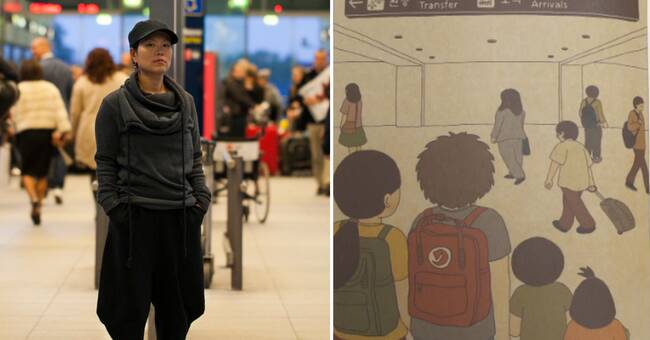- I had an official paper that said that I was orphaned and that I had a completely unknown background.
That paper was the basis for my adoption, says Lisa Wool-Rim Sjöblom.
- I then understood when I found my mother that it was completely made up.
She had not given her approval, she did not want to leave me and my father did not even know that I existed, says Lisa Wool-Rim Sjöblom.
Palimpsest is an autobiographical, almost documentary, book.
As the main character Lisa discovers lie after lie in the adoption apparatus - her image of what the adoption actually meant changes.
- I went into this with the idea that adoption was positive, that it was something done to save children who had no parents.
Then I found out that my papers were deliberately falsified by officials, that the Adoption Center is lying and the adoption agency in Korea is lying.
It was a trauma, says Lisa Wool-Rim Sjöblom.
About a hundred Swedish works on adoption
Dagens Nyheter's large series of articles on illegal adoptions has exposed deep wounds and led to a political discussion.
But in the literature, the subject of adoption has been addressed for decades.
- There are about a hundred works written by adoptees from other countries.
They have come out in a fighting current since the 1990s and until today, says Tobias Hübinette, researcher at Karlstad University, who has reviewed all literature in the field.
Why do you think the subject is so important to write about?
- It is a unique experience to have both grown up with parents that you do not genetically relate to and at the same time not be white.
Most of the adoptees are from non-European countries.
It is the combined experience that emerges in these works, says Tobias Hübinette.
Forbidden to talk about
But despite the fact that adoption has been described so much - this with illegal adoptions has been something of a taboo, also in the literature.
- It has been an issue that has been very difficult to address, also for the adoptees themselves.
Of course, many adoptees have known about this, but talking about it in public or in the literature, the adoptees in Sweden have avoided doing.
It has been perceived as something forbidden to talk about, says Tobias Hübinette.
Requires truth commission
Lisa Wool-Rim Sjöblom's forthcoming book is called The Excavated Earth.
The book is about Chile-adopted Maria Diemar, who fought a struggle for redress for those who were adopted illegally from Chile.
Lisa Wool-Rim Sjöblom welcomes the political discussion that has gained momentum during the week and hopes for a state settlement with the past.
- The least we can ask for is a truth commission.
But I also want the adoption agencies to apologize to the victims, says Lisa Wool-Rim Sjöblom.

